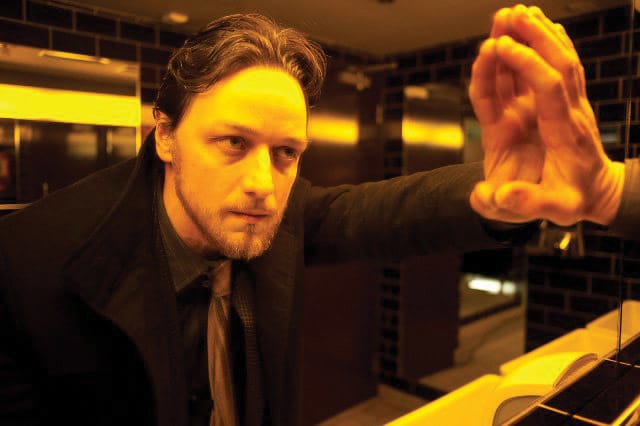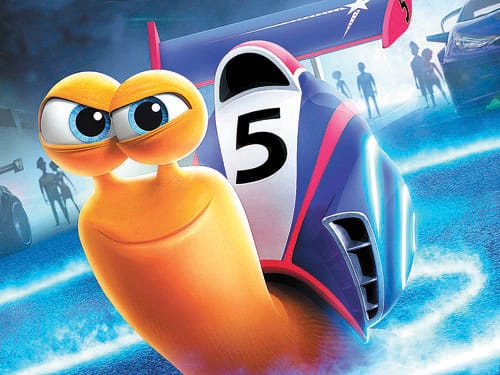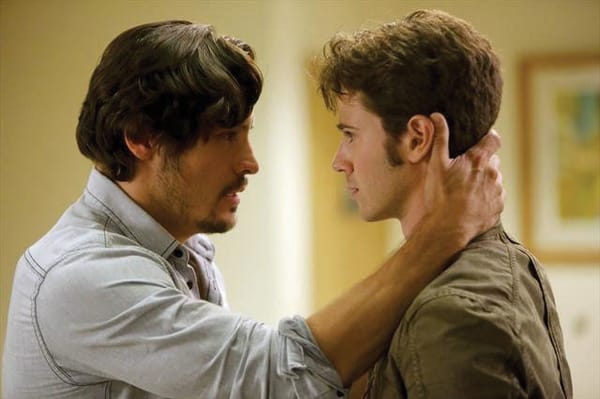McAvoy’s filthy habits
Welcome to Scotland: where we are greeted by Bruce Robertson (McAvoy), a coke-snorting, alcohol-addicted, sex-loving detective who’s gunning for a promotion to the position of detective inspector.

Welcome to Scotland: where we are greeted by Bruce Robertson (McAvoy), a coke-snorting, alcohol-addicted, sex-loving detective who’s gunning for a promotion to the position of detective inspector. In order to get there, he needs to eliminate his competition. And by eliminate we don’t mean kill, but rather publicly humiliate so they’ll be out of the running. He’s racist, sexist, and every kind of -ist you can think of, and as we find out more about this troubled man, you begin to question the narrator’s mental state as he has distressing visions that get in the way of his boozy, dopey life. That someone like Bruce is in the law enforcement line of work already provides some solid groundwork for the film to build on.
Robertson’s visions of disturbing animals (pigs, sheep, you name it) don’t even begin to cover how energetically bonkers this film is. Why is the narrative interrupted at times by Bruce’s wife Carole (Shauna Macdonald) who constantly breaks the fourth wall talking to the audience about her married life to Bruce? Why does Bruce keep seeing a tar-stained boy in the corner of his eyes? Or how about the nightmarish therapy sessions he imagines being a part of, where Dr Rossi (Jim Broadbent), with a grossly enlarged sci-fi alien head, keeps hounding Bruce with unsettling questions?
A Japanese student who turns up dead sets off the motion of events, as taking the lead on this case could effectively get Bruce a step closer to the promotion. But the film’s plot never remains solely on solving the case, nor does it concentrate on Bruce’s sly and devious plans to take down his colleagues. Filth is really all about Bruce, and every single detail of his personal and professional life is laid out for the audience as we try to piece together just what on earth must have happened to create such a person.
McAvoy is startlingly good in his mentally unhinged role that becomes more and more unpredictable and outrageous as time passes by. With every nervous twitch he shows, captured closely by so many uncomfortably zoomed-in close-ups, his extremely physical performance is one thing that carries the movie and keeps everything together despite the many off-beat strands that don’t quite gel very well. Arousal of sympathy for a character like Bruce is not the easiest task to convey, but with McAvoy showing a softer, more vulnerable side to his unsteady self, which plays a pivotal role in selling the big reveal in the final scenes of the film.
The supporting roles are largely unmemorable (Jamie Bell, Imogen Poots both have relatively thankless roles even with their big names), aside from Broadbent putting on a performance twice as creepy as the one he showed us in Moulin Rouge, and Eddie Marsan, the kind-hearted, rich best friend of Bruce who is constantly manipulated and pushed around by his detective friend. Being a sensible, insecure softie suits Marsan, as he is responsible for bringing out both the best and worst in Bruce who, quite frankly doesn’t deserve a friend like him.
Although starting with a cynical, black comedy view of Scotland, the film winds up in places you never thought would go. Word is, the novel of the same name the film is based on is more daring with even less clear boundaries. It feels as though that given the film’s title, the overall content could have been more edgy or darker, and not perhaps relying solely on the talent of the film’s leading man. The structure is no doubt a mess, but anchored by a superb performance from an actor whose extreme volatility screams mental breakdown, Filth is a wacky, unmissable ride, one that is guaranteed to shock and offend and quite possibly make you think twice before visiting Scotland.








